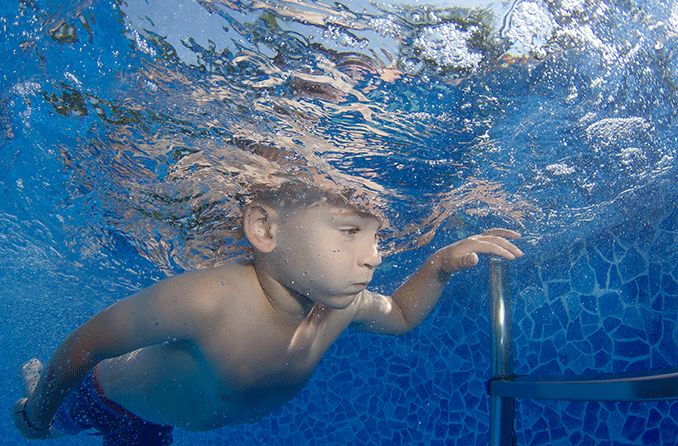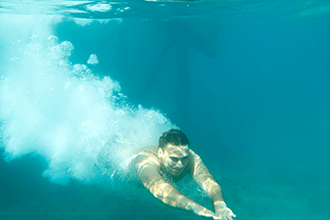Should you open your eyes underwater?

Can water damage your eyes if you swim with your eyes open?
You should wear swim goggles or keep your eyes closed underwater. This is true whether you’re in a pool, hot tub, lake, river or the ocean. Opening your eyes underwater without protection can lead to an allergic reaction, eye irritation or a serious eye infection that may cause vision loss.
Can you open your eyes in a swimming pool?
You may think it would be safe to open your eyes in a swimming pool. The water is chlorinated after all. But opening your eyes in a pool is actually a bad idea for several reasons.
You can still get an eye infection from opening your eyes in a pool, especially if the water hasn’t been treated properly. Swimming pool water may contain bacteria, viruses, protozoa and molds. Swimming in pools has caused outbreaks of illness that led to pink eye (conjunctivitis) in swimmers. One study indicated that as many as 10% of routine checks of pools, hot tubs and water parks have resulted in immediate closure due to improper water treatment.
READ MORE: Why you should avoid swimming with pink eye
Second, chlorine can hurt your eyes because it’s a powerful chemical and eye irritant. Chlorine and other pool chemicals can disrupt your tear film, which consists of oils, mucus and water. Your tear film also keeps your eyes moist and comfortable.
Unfortunately, exposure to pool chemicals can lead to dry eyes, which can cause a wide range of discomfort.
Opening your eyes underwater in a chlorinated pool may cause:
Blurry vision
Eye irritation or pain
Eye redness
Sensitivity to light (photophobia)
All this said, can chlorine damage your eyesight? Chlorine may harm your eyes temporarily, especially if you open them underwater. But they should recover quickly with rest, cool compresses and artificial tears.
It’s best to avoid these eye issues in the first place by wearing a well-fitting pair of swim goggles. Goggles will safely let you see underwater while protecting your eyes from infection and irritation.
Can you open your eyes in the ocean?

You should never open your eyes while swimming in the ocean because the saltwater may irritate your eyes. Plus, you could get an eye infection. In fact, scientists have found more of the bacteria and viruses known to cause eye infections in ocean water than in swimming pools.
You may wonder, “why does saltwater irritate my eyes when tears are made of saltwater?” Ocean water is much saltier than tears. Due to the high salt content, ocean water may dehydrate your eyes and cause eye burning and stinging.
If you plan to swim in the ocean and want to see underwater, swimming goggles or a diving mask will protect your eyes.
Can you open your eyes in a lake or river?
You should never open your eyes when swimming in a lake or river as doing so puts you at risk for a serious eye infection. The freshwater in lakes and rivers may be contaminated with algae, chemicals and microbes from agricultural runoff, sewage spills or other swimmers.
Since lakes and rivers aren’t disinfected with chlorine or other chemicals like pools, hot tubs and splash pads, they may put you at higher risk for an eye infection. You should always wear well-fitting swim goggles and dry your face off as soon as you get out of the water.
Swimming in a lake or river, especially if you open your eyes, can cause pink eye or more serious parasitic eye infections.
READ MORE: River blindness: Causes, symptoms, risks and treatment
Can you open your eyes underwater with contacts?
Opening your eyes underwater with contacts carries additional risks. The U.S. Food & Drug Administration recommends that you don’t expose your contacts to any water. This includes tap, bottled, distilled, pool, lake or ocean water.
If you do swim with contacts in, it’s best to use daily disposables and wear waterproof swim goggles.
This is important because contact lens wearers face an especially high risk of serious eye infections caused by bacteria, viruses and parasites in water. One particularly dangerous eye infection is acanthamoeba keratitis (AK).
AK is often associated with wearing contacts in pools or hot tubs. This parasitic corneal infection can cause vision loss or even blindness. Contact lens wearers need to be careful in water because contacts provide a place for bacteria and other microbes to grow.
Contact lens wearers may also experience more irritation and corneal damage from pool chemicals. Opening your eyes underwater in a chlorinated swimming pool while wearing contacts can damage the eyes. This is because the contacts absorb the chlorine, causing extended contact with the surface of the eye.
Can you open your eyes underwater after LASIK?
You should not open your eyes underwater after LASIK. If you’ve recently had laser eye surgery, your eye surgeon will give you instructions for what to do. And they will also explain what not to do, during the healing period.
For example, your eye surgeon may recommend that you not swim for at least the first six weeks or so after laser eye surgery. You may face a higher risk of waterborne eye infections while your eyes are healing. Plus, even wearing swim goggles during this period could delay the healing process.
Talk to your eye doctor about how long to wait before swimming after LASIK or other eye surgery. And as outlined above, don’t open your eyes underwater after LASIK, even after your eyes have healed.
See your eye doctor
If you develop troublesome eye symptoms after swimming, see your eye doctor right away. They can perform an eye exam, diagnose the problem and prescribe the right treatment. And you’ll be back to swimming (with quality swim goggles) in no time.
READ NEXT: What are Smart Swim Goggles and What Do They Do?
A review and update on waterborne viral diseases associated with swimming pools. International Journal of Environmental Research and Public Health. January 2019.
Recreational water illnesses. Centers for Disease Control and Prevention. April 2022.
Mayo Clinic Minute: Should you open your eyes underwater? Mayo Clinic. June 2021.
Swimming and eye health. U.S. Masters Swimming. March 2015.
Swimming with the sharks. Review of Optometry. June 2014.
Ask a scientist: underwater eyes. National Eye Institute. January 2015.
A comparison of bacteria present in South Florida ocean and pool water with known ocular pathogens. Investigative Ophthalmology & Visual Science. May 2003.
The surprising health risks of Oklahoma lakes. Integris Health. August 2018.
Contact lens risks. U.S. Food & Drug Administration. September 2018.
Eyes react to pool water. University of Iowa Hospitals & Clinics. June 2017.
Acanthamoeba keratitis FAQs. Centers for Disease Control and Prevention. November 2010.
Page published on Wednesday, June 22, 2022
Medically reviewed on Tuesday, March 29, 2022






